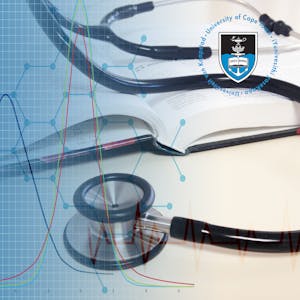If you've ever felt daunted by statistical terms in medical papers, this course is for you. Whether you're a clinical practitioner or a medical student, gaining confidence in understanding statistical analysis is crucial. In this comprehensive course, you'll learn to interpret statistical results presented in the published literature and research, and gain an overview of widely used statistical analysis techniques.
This course covers study types, data description, statistical analysis, hypothesis testing, confidence intervals, test selection, and analyzing categorical data. With engaging modules and opportunities for self-assessment, you'll build the foundational knowledge needed to navigate the world of clinical literature and research.
Certificate Available ✔
Get Started / More Info
The course covers study types, data description, statistical analysis, hypothesis testing, confidence intervals, test selection, and analyzing categorical data. Each module offers in-depth learning and self-assessment opportunities.
This module provides an introduction to different study types in clinical research, including observational, experimental, case series, case-control, cross-sectional, and cohort studies. Learners will gain a solid understanding of the various study designs and their applications in research.
This module focuses on data description, covering key concepts, data types, measures of central tendency, measures of dispersion, and sampling methods. Learners will also explore descriptive statistics and visual representation of data.
In this module, learners will build an intuitive understanding of statistical analysis, including concepts such as P-values, probability, distributions, central limit theorem, and more. Practical examples and case studies will enhance comprehension of statistical concepts.
This module delves into hypothesis testing and confidence intervals. Learners will explore null and alternative hypotheses, hypothesis testing errors, confidence levels, and interval estimation. Practical exercises and self-assessment quizzes are included to reinforce learning.
Learners will explore parametric and nonparametric tests in this module, including the use of Student's t-test, ANOVA, linear regression, and nonparametric tests for comparing data. Practical applications and case studies will reinforce understanding of test selection.
This module focuses on analyzing categorical data, covering contingency tables, chi-square tests, Fisher's exact test, sensitivity and specificity, predictive values, and risk and odds ratios. Learners will gain practical skills in analyzing accuracy of results for categorical data.
El rol docente del médico residente es un curso que explora el importante papel educativo de los médicos en formación, mejorando la calidad de enseñanza y contribuyendo...
MRI Fundamentals is a comprehensive course covering the basic principles of magnetic resonance imaging (MRI). Learners will gain expertise in MRI physics, data acquisition...
Operational Research for Humanitarians is a comprehensive course that equips humanitarian professionals and junior researchers with essential knowledge and skills...
Psychological Research specialization offers foundational knowledge in research design, data analysis, and ethical standards in psychology. Ideal for undergraduates,...